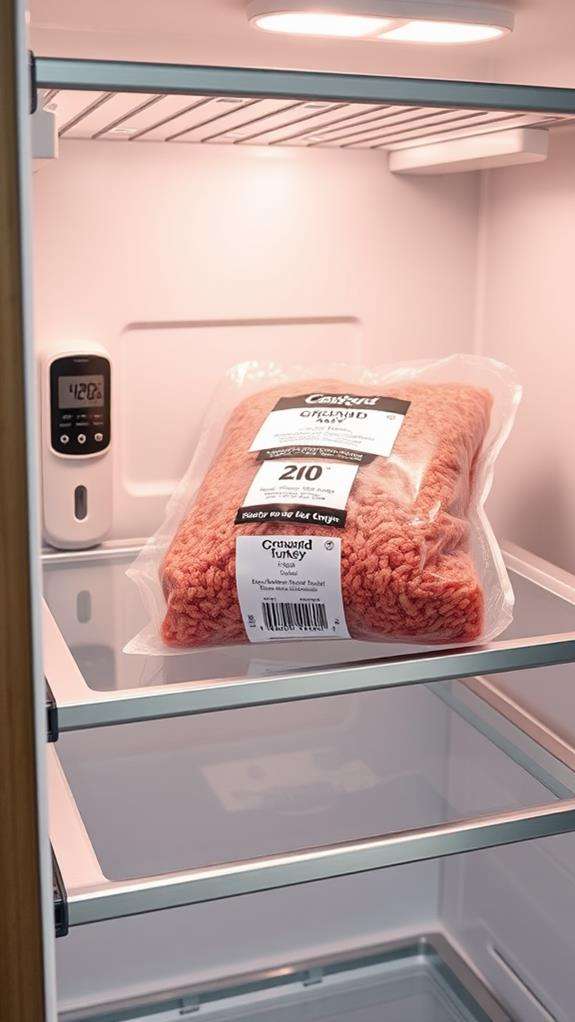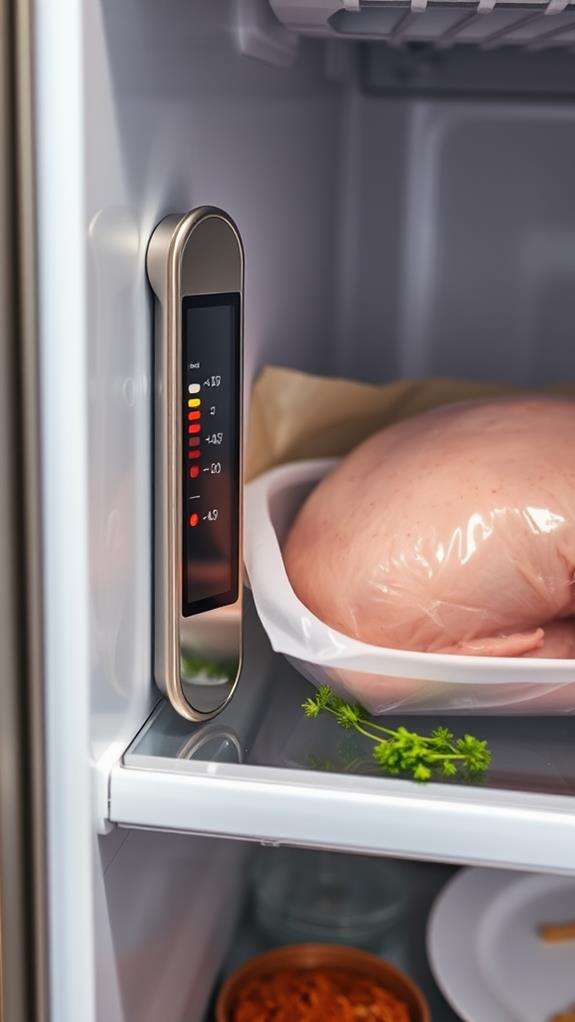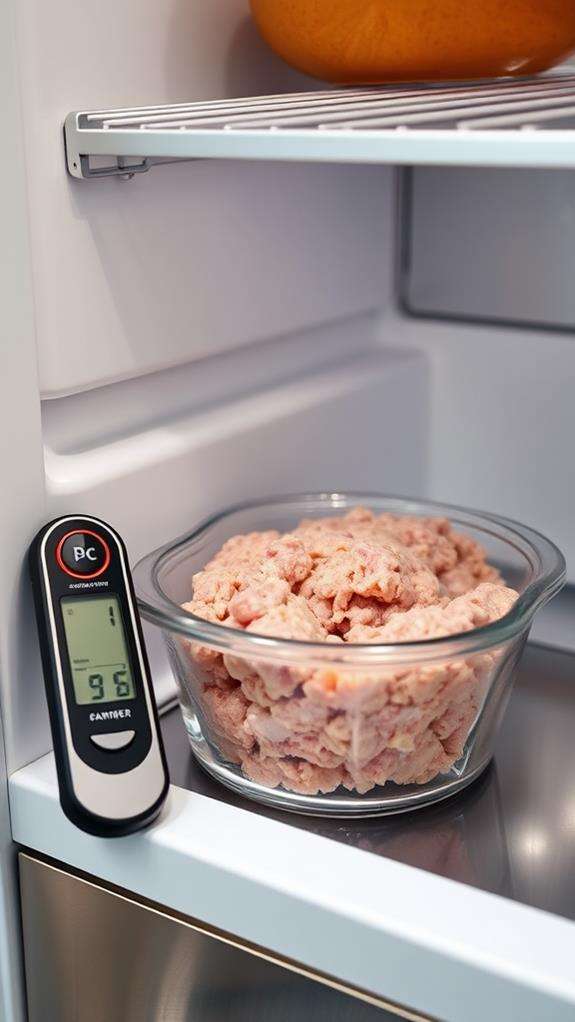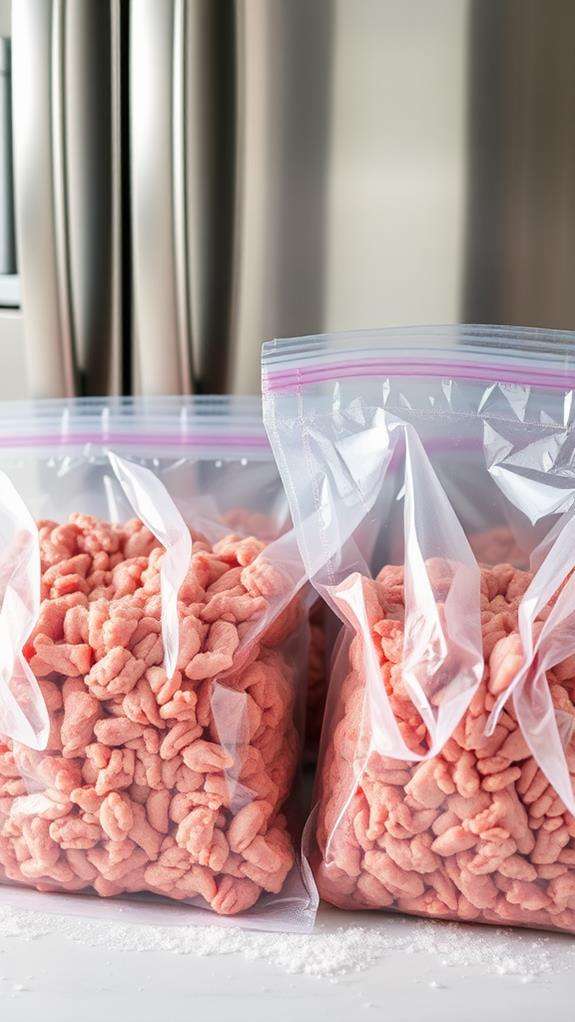How Long Does Ground Turkey Last in the Fridge
Ground turkey has distinct storage timeframes depending on whether it's raw or cooked. Raw ground turkey will last 1-2 days in your fridge when stored at or below 40°F (4°C), while cooked ground turkey remains safe for 3-4 days. You'll need to store it in airtight containers or tightly wrapped packaging in the coldest part of your refrigerator, ideally between 35-38°F. Watch for signs of spoilage like grayish-brown coloring, slimy texture, or off-putting odors. For maximum safety, refrigerate your turkey within 2 hours of purchase or cooking, and always use a meat thermometer to confirm proper cooking temperatures. Understanding proper storage techniques can help extend your ground turkey's freshness even further.
This post may contain affiliate links. If you make a purchase through these links, I may earn a commission at no additional cost to you. Additionally, portions of this post may be generated using artificial intelligence (AI) technology. While we strive for accuracy, please be aware that AI-generated content may not always be perfect and should be fact-checked when necessary.
The Spatula Scoops
- Raw ground turkey lasts 1-2 days in the refrigerator when stored at or below 40°F in original packaging or airtight containers.
- Cooked ground turkey remains safe for 3-4 days when refrigerated in a covered container at 40°F or below.
- Store ground turkey in the coldest part of your fridge, ideally between 35-38°F, to maximize freshness.
- Discard ground turkey if it shows signs of spoilage: grayish-brown color, sour odor, or slimy texture.
- Refrigerate ground turkey within 2 hours of purchase or cooking to prevent bacterial growth in the danger zone.
Safe Storage Time Guidelines

When properly stored, raw ground turkey can last 1-2 days in the refrigerator at 40°F (4°C) or below. To maximize freshness, you'll want to store it in its original packaging if you're planning to use it within 24 hours. For longer storage, you should wrap the meat tightly in plastic wrap or transfer it to an airtight container.
If you've cooked your ground turkey, you can store it in the refrigerator for 3-4 days. You'll need to place it in a shallow, covered container to guarantee proper cooling and prevent bacterial growth. Once your cooked turkey reaches room temperature, you've got a 2-hour window to refrigerate it before it enters the "danger zone" where bacteria multiply rapidly.
For extended storage, you can freeze ground turkey. Raw ground turkey will maintain its best quality for 3-4 months in the freezer at 0°F (-18°C) or below. You'll want to wrap it tightly in freezer paper or heavy-duty aluminum foil, or place it in freezer bags with as much air removed as possible. Don't forget to label the package with the date of freezing.
Signs of Spoiled Ground Turkey

Identifying spoiled ground turkey requires attention to three key signs: color, smell, and texture. You'll need to examine your ground turkey carefully before cooking to verify it's safe for consumption.
- Color changes: Fresh ground turkey should appear light pink or beige. If you notice any grayish-brown, green, or dark spots, your meat has likely started to spoil. These discolorations indicate bacterial growth and oxidation, making the meat unsafe to eat.
- Odor assessment: Fresh ground turkey has virtually no smell or a very mild poultry scent. If you detect any sour, rancid, or sulfur-like odors when opening the package, don't take any chances – it's time to discard the meat. Trust your nose, as it's one of your best tools for detecting spoilage.
- Texture evaluation: When you touch fresh ground turkey, it should feel slightly moist but firm. If the meat feels sticky, slimy, or unusually wet to the touch, bacteria have likely begun breaking down the protein structures. You'll want to dispose of any ground turkey that exhibits these texture changes immediately.
Proper Refrigeration Temperature

To prevent the spoilage signs mentioned above, maintaining the right refrigeration temperature serves as your first line of defense. Your refrigerator's temperature should consistently stay at or below 40°F (4.4°C), with 35-38°F (1.7-3.3°C) being the ideal range for storing ground turkey.
| Temperature Range | Safety Level | Storage Duration |
|---|---|---|
| Above 40°F (4.4°C) | Danger Zone | Unsafe for Storage |
| 35-38°F (1.7-3.3°C) | Ideal | 1-2 Days Fresh |
| Below 32°F (0°C) | Too Cold | May Affect Quality |
You'll want to invest in a reliable refrigerator thermometer to monitor these temperatures accurately. Don't rely solely on your fridge's built-in temperature gauge, as it might not provide precise readings. Place the thermometer in the center of your middle shelf, where temperatures are most consistent. If you notice fluctuations above 40°F, adjust your refrigerator's settings immediately. Remember that opening and closing your fridge door frequently can cause temperature variations, so you'll want to minimize this activity when possible, especially right after storing fresh ground turkey.
Raw Vs Cooked Storage

Raw and cooked ground turkey require different storage approaches to maintain food safety and quality. Your raw ground turkey needs immediate refrigeration and should be used within 1-2 days of purchase, while properly stored cooked ground turkey can safely last 3-4 days in your refrigerator at 40°F or below. When you're storing either raw or cooked ground turkey, always use airtight containers or well-sealed plastic bags to prevent cross-contamination and maintain freshness.
Raw Ground Turkey Safety
Safe handling of ground turkey requires understanding key storage differences between raw and cooked meat. When you're dealing with raw ground turkey, you'll need to be extra vigilant about temperature control and cross-contamination prevention, as bacteria can multiply rapidly between 40°F and 140°F (the temperature danger zone).
- Always store raw ground turkey at 40°F or below, preferably in the coldest part of your refrigerator, and place it in a sealed container or plastic bag to prevent any juices from dripping onto other foods
- Don't let raw ground turkey sit out at room temperature for more than 2 hours (or 1 hour if it's above 90°F outside), as this promotes dangerous bacterial growth
- Keep raw ground turkey in its original packaging until you're ready to use it, and check the "sell by" date carefully – you should cook or freeze it within 1-2 days of purchase
If you notice any off-putting odors, slimy texture, or color changes from pink to gray or brown, it's best to discard the meat immediately. These signs indicate bacterial growth that could lead to foodborne illness.
Cooked Storage Guidelines
Properly stored, cooked ground turkey has different storage requirements than its raw counterpart. Once you've prepared your ground turkey, you'll need to refrigerate it within two hours of cooking to prevent bacterial growth. In your refrigerator, cooked ground turkey will stay safe to eat for 3-4 days when stored at 40°F (4°C) or below in an airtight container.
You can extend your cooked ground turkey's shelf life by freezing it. When stored in a freezer-safe container or heavy-duty freezer bag, it'll maintain its best quality for up to 4 months, though it'll remain safe indefinitely at 0°F (-18°C) or below. To prevent freezer burn, you'll want to remove as much air as possible from the storage container and label it with the date.
When you're ready to use your frozen cooked ground turkey, thaw it in the refrigerator overnight. Once thawed, you should use it within 1-2 days. Don't leave cooked ground turkey at room temperature for more than two hours, or one hour if the ambient temperature exceeds 90°F (32°C).
Extending Ground Turkey Shelf Life

The shelf life of ground turkey can be considerably extended through smart storage practices and careful handling. You'll want to implement several proven techniques to maximize freshness and prevent bacterial growth, which can quickly compromise your meat's safety and quality.
- Maintain consistent temperature control by storing ground turkey in the coldest part of your refrigerator (typically around 35°F to 38°F), and don't let it sit at room temperature for more than 2 hours before refrigerating or cooking.
- Use airtight containers or freezer-grade plastic wrap to create a proper seal, which prevents exposure to air and moisture that can accelerate spoilage. If you're planning to freeze the meat, double-wrap it to prevent freezer burn.
- Practice the "first in, first out" method by labeling your ground turkey packages with purchase and storage dates. You'll want to use permanent markers and freezer-safe labels to guarantee the information remains legible throughout storage.
Food Safety Best Practices

To keep your ground turkey safe for consumption, you'll need to maintain proper storage temperatures of 40°F (4°C) or below in your refrigerator and 0°F (-18°C) or below in your freezer. When handling raw ground turkey, you must always use clean utensils and cutting boards, wash your hands thoroughly with soap and warm water before and after contact, and avoid cross-contamination with other foods. You can further protect yourself by using separate cutting boards for meat and produce, wiping counters with antibacterial cleaners after meal prep, and ensuring your ground turkey reaches an internal temperature of 165°F (74°C) when cooking.
Proper Storage Temperatures
Maintaining safe storage temperatures stands as your first line of defense against foodborne illness when handling ground turkey. Your refrigerator should consistently stay at or below 40°F (4°C), while your freezer needs to maintain 0°F (-18°C) or lower. You'll want to use a reliable refrigerator thermometer to monitor these temperatures regularly, as fluctuations can greatly impact your ground turkey's safety and shelf life.
When handling ground turkey, follow these critical temperature guidelines:
- Store fresh ground turkey in the coldest part of your refrigerator, typically the back bottom shelf, where temperatures remain most stable.
- Transfer ground turkey from your shopping cart to your refrigerator within 2 hours, or within 1 hour if the ambient temperature exceeds 90°F.
- Keep frozen ground turkey at a constant 0°F, and avoid temperature fluctuations that occur from frequent freezer door openings.
Remember that your refrigerator's door compartments experience the most temperature variation, so never store ground turkey there. Instead, place it in sealed containers or wrapped tightly in plastic on lower shelves, where colder air settles and maintains consistent temperatures.
Safe Handling Guidelines
Practicing safe handling of ground turkey greatly reduces your risk of foodborne illness. When you're working with raw ground turkey, always start by washing your hands thoroughly with soap and warm water for at least 20 seconds. You'll want to use separate cutting boards and utensils for raw meat and other ingredients to prevent cross-contamination.
Never thaw ground turkey on your counter at room temperature. Instead, you should defrost it in your refrigerator, in cold water (changing the water every 30 minutes), or in your microwave if you're planning to cook it immediately. When you're preparing the meat, don't wash it, as this can spread bacteria to other surfaces. Use a meat thermometer to guarantee your ground turkey reaches 165°F (74°C) throughout.
After handling raw turkey, clean all surfaces thoroughly with hot, soapy water. This includes countertops, cutting boards, and any utensils you've used. Don't forget to sanitize your sink and faucet handles, as you've likely touched them with contaminated hands. Store any leftover cooked ground turkey in airtight containers within two hours of cooking.
Freezing Ground Turkey

Freezing ground turkey is one of the most effective ways to extend its shelf life. When properly stored in your freezer at 0°F (-18°C), ground turkey can remain safe to eat for up to 4 months. You'll want to package your ground turkey carefully to prevent freezer burn and maintain its quality during storage.
Here's how to properly freeze your ground turkey:
- Wrap the meat tightly in plastic wrap or heavy-duty aluminum foil, then place it in a freezer-safe plastic bag, removing as much air as possible to prevent freezer burn
- Label each package with the date of freezing and weight, so you'll know exactly how long it's been stored and can plan meals accordingly
- Store the wrapped ground turkey in the back of your freezer where temperatures remain most consistent, avoiding the door area where temperature fluctuations occur
When you're ready to use your frozen ground turkey, transfer it to your refrigerator and allow 24 hours for every 1-2 pounds to thaw completely. Don't thaw at room temperature, as this can promote bacterial growth and compromise food safety.
Thawing Methods and Tips

When it comes to thawing ground turkey, you've got three safe methods at your disposal: refrigerator thawing, cold water thawing, and microwave defrosting. The refrigerator method is your safest bet, though it requires planning ahead, as you'll need to allow 24 hours for every 1-2 pounds of meat.
For cold water thawing, you'll need to keep your ground turkey in its sealed packaging or transfer it to a leak-proof plastic bag. Submerge it completely in cold water, changing the water every 30 minutes to maintain a safe temperature. This method typically takes about an hour per pound of meat.
If you're short on time, you can use your microwave's defrost setting. Place the meat in a microwave-safe container, and defrost in 2-minute intervals, rotating and flipping the meat frequently. Remember, once you've thawed ground turkey in the microwave, you'll need to cook it immediately, as some portions may begin cooking during the defrosting process.
Don't leave your ground turkey on the counter to thaw at room temperature, as this can lead to dangerous bacterial growth in the temperature danger zone between 40°F and 140°F.
Storage Container Recommendations

The right storage container can make or break your ground turkey's freshness. When you're storing raw ground turkey, you'll want to choose containers that create an airtight seal and prevent any cross-contamination in your refrigerator. Glass or high-quality plastic containers with snap-on lids are your best options, as they'll maintain freshness while blocking out unwanted odors and moisture.
For ideal storage of your ground turkey, consider these essential container features:
- Air-tight sealing mechanisms that prevent bacterial growth and freezer burn, such as silicone-lined lids or vacuum-seal capabilities
- Non-porous materials that won't retain odors or stains, preferably BPA-free plastic or tempered glass with proper temperature resistance
- Stackable designs with clear visibility to help you organize your refrigerator space and easily monitor the turkey's condition
If you're planning to freeze your ground turkey, consider using freezer-specific storage bags or containers designed for sub-zero temperatures. These specialized containers often feature double-seal technology and thicker walls to prevent freezer burn. You'll also want to remove as much air as possible before sealing to maintain the meat's quality and prevent ice crystal formation.
Frequently Asked Questions
Can I Refreeze Ground Turkey After Thawing It in the Refrigerator?
Yes, you can safely refreeze ground turkey that's been thawed in the refrigerator, but you'll want to do it within 1-2 days of thawing. However, you should know that refreezing may impact the meat's quality and texture, as ice crystals can break down muscle fibers during the freezing process. If you've thawed the turkey using other methods (like microwave or cold water), don't refreeze it—use it immediately.
Does Seasoning Ground Turkey Before Storage Affect Its Shelf Life?
When you're preparing your protein for later, adding seasonings to ground turkey before storage can slightly impact its shelf life. Salt, in particular, draws out moisture and can accelerate bacterial growth, potentially reducing freshness by a day or two. You'll want to store unseasoned ground turkey for best results. If you've already seasoned it, you should use it within 1-2 days, rather than the standard 3-4 days for unseasoned meat.
Should Ground Turkey Be Stored on Upper or Lower Refrigerator Shelves?
You'll want to store your ground turkey on the bottom shelf of your refrigerator, as this is the coldest spot and helps prevent cross-contamination. If any juices leak from the package, they won't drip onto other foods below. For extra safety, you can place the ground turkey on a plate or in a shallow container to catch any potential drips. The lower shelf placement also helps maintain a consistent temperature.
Can I Mix Different Dates of Ground Turkey in the Same Container?
Even if you've got a mountain of ground turkey packages tempting you, you shouldn't mix different dates in the same container. Raw ground turkey from different production dates might have varying levels of bacteria and different expiration timelines. When you combine them, you're risking cross-contamination and making it impossible to track freshness accurately. Instead, keep them in separate containers and label each with its original purchase date.
Does Organic Ground Turkey Have a Different Refrigeration Shelf Life?
Organic ground turkey follows the same refrigeration timeline as conventional ground turkey. You'll need to store it at or below 40°F (4°C), and it'll stay fresh for 1-2 days in your fridge. The "organic" label refers to how the turkey was raised and processed, but it doesn't affect the meat's natural spoilage rate. You should still follow standard food safety guidelines, checking for changes in color, smell, or texture before use.





